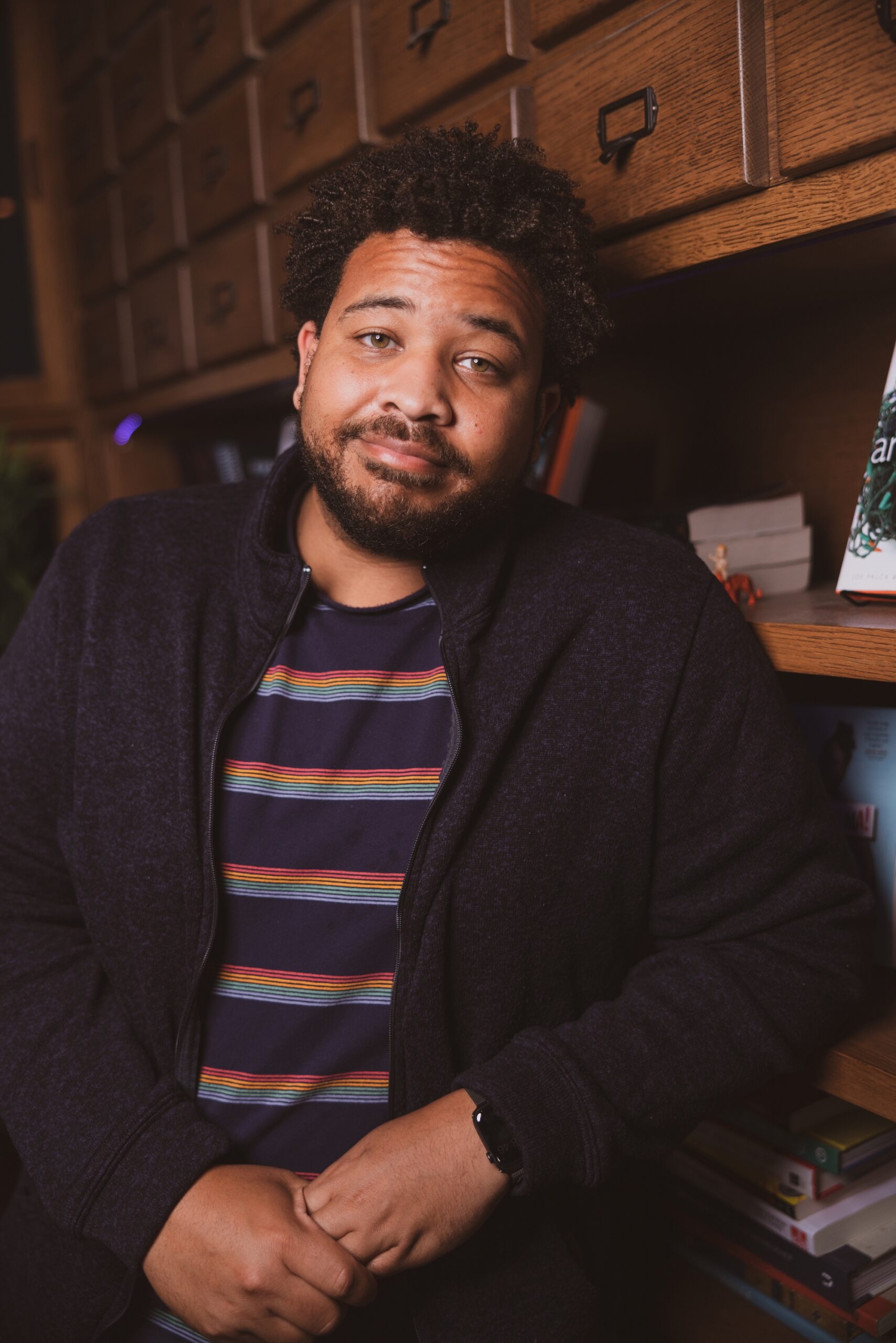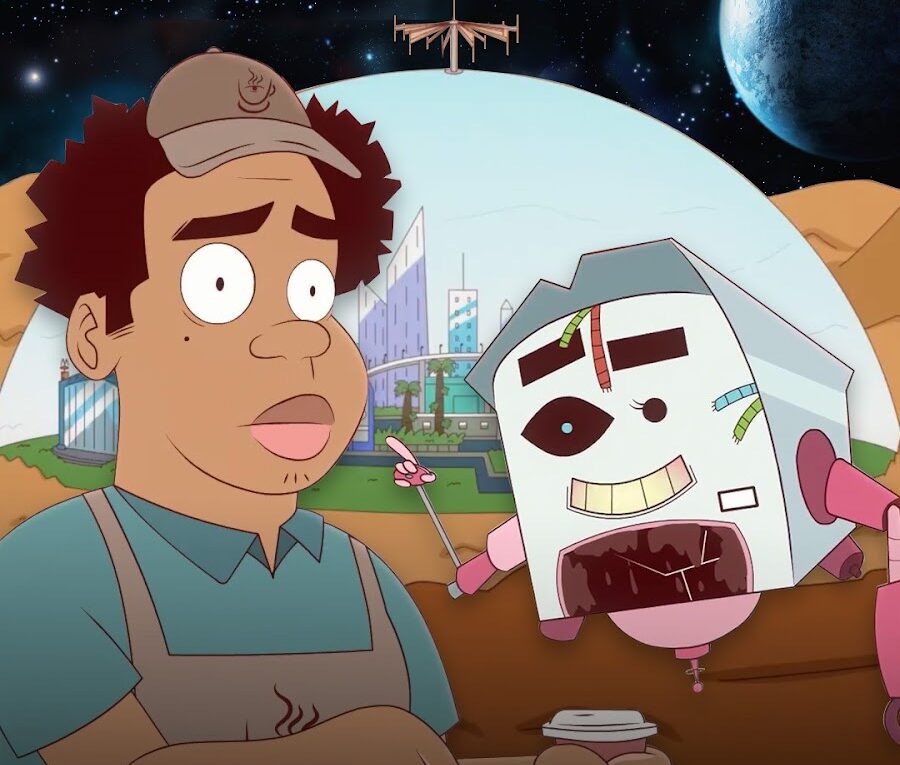Exclusive: Comedian Tim Barnes On Bringing Maurice on Mars For Comedy Central Digital

John Schwarz: Hi Tim, can you tell us a little bit about yourself? Where are you from and how did you get into animation?
Tim Barnes: Hello! Well, I’m a comedian and TV writer. But in the long and winding road that lead to confidently being able to say that, I’ve been everything from the guy making your Dunkaccino in a Chicago Dunkin’ Donuts, to a video editor and podcast producer. I’ve always straddled that line of being both behind the scenes and “on stage.” And what I’ve learned to love about animation is that you can get a bit of both worlds in the creation process.
I’m originally from South Central, Los Angeles. I grew up there before they officially removed the “Central” from the name and wasn’t really allowed to go outside. And, when I did, I wasn’t allowed to go around the block. I guess it was dangerous back then. But I was happy enough with my TV shows, books, and movies. I moved to Riverside, California in my last year of middle school. And met my good friend Ian Abramson freshman year of high school. About six years later we both moved to Chicago to pursue comedy. And now I’m here! Talking to you about my animated comedy project!
I think I got into animation the way most of us do: Saturday morning cartoons. Animaniacs, X-Men, Batman: The Animated Series, and Hey Arnold! were all massive influences on me. Especially Animaniacs and Hey Arnold! When I’m in times of doubt I often think to myself “What would Arnold do?” And when I had my first staff writing job on the reboot of Nickelodeon’s All That, I printed a photo of Chicken Boo and pinned it to the corkboard above my desk because I think it’s just the greatest sketch premise ever conceived.
Ultimately, I don’t think of animation any differently from live action TV or film. Before comedy, I wanted to be a filmmaker, and I consider animation to just be an extension of that. A big first step for me in that direction came during the pandemic. Grant Lindahl, a talented animator who created the Comedy Central series Tales From The Trip reached out to me early into lockdown about wanting to collaborate on something, and I ended up creating a webcomic with him called Uncertain Life. I write them, and he illustrates them. We’re currently taking a break after 100 issues to retool it. But in this first phase of the webcomic we’ve already started to hone in on things like generally sticking to four panels, and setting up certain rules for the surreal world. I’ve learned a lot from that about how to collaborate with illustrators and subtly get jokes across with the right balance of words and images. So, when the opportunity came along to develop this idea I had been tinkering around with about life on Mars, I had certain skills under my belt from all the random jobs I mentioned earlier (video editing, audio producing, collaborating with artists, and writing for television) that came in handy. Even the Dunkaccino skills.
What are some of your favorite animated series either now or from your past that you feel has influenced you in some way, especially with this series?
What I love most about Hey Arnold! is that it didn’t talk down to its audience and the kids and adults were on relatively equal footing, at least conversationally. Also, as a kid who spent a lot of time indoors in a car reliant city like Los Angeles, Hey Arnold! presented a world of possibility. The city Arnold and the gang are in feels specific but also isn’t, and everyone seems to own the world of being outdoors. I was very jealous of those kids, and kind of lived through those characters in a way.
I could write an entire essay on Chicken Boo, but I’ll save you the time. Let’s talk about Daria! Believe it or not, I first started watching Daria during the pandemic and immediately felt guilty that I had never started it earlier because it would have made me feel way more confident about my jaded personality had I watched it in high school. The show does just about everything right. What I love most is its rhythm and cadence. I haven’t tried this, but I could probably just listen to audio from an episode while driving and have a pretty good time.
How did the idea of Maurice come about?
A comedy that takes place on a Martian colony was something I had been vaguely tinkering with for a few years at that point. For a long time the entire idea was “A bodega on Mars!” That’s it. Just a lone corner store on a barren planet and the people who go in and out of it. But in 2020, after the global pandemic, and global wave of protests following the murder of George Floyd, and the first private space launch, it all crystalized itself into a story I called Maurice on Mars. It’s clear to me that we’re going to be there. But it isn’t clear to me how Mars will affect our social structures. I wanted to make a sci-fi comedy that focused on that.
I had previously worked at Comedy Central a few years prior writing digital sketches like Baby Mumble Rapper, Sinmo, and The Rage Restaurant – so, I had a good grasp of the internal landscape, which made production run pretty smoothly in my opinion.
What were some visual inspirations for the look and aesthetics of the series?
First, I was very excited to bring a talented young artist named Ucheoma Uzosike (@Ucheomaaa on IG) into the fold. I discovered his webcomics while making Uncertain Life. He designed all of the characters in Maurice on Mars and I love his work because it feels like a mix of Tex Avery, 90s Nick, and anime, all while feeling incredibly modern and unique.
Beyond that, Hey Arnold! and King of the Hill were my primary examples in terms of tone setting for the designs and characters. I wanted to exaggerate certain features but also have the characters and world seem grounded. I feel like Futurama has already explored everything about the wackiness of a heightened future. I wanted to explore a mundane future with a few flashes of extravagance when necessary.
I also ended up deciding that this is an unspecified future, which I think freed up the visual style. My hope is that this is viewed as a vision of the future that could have been written in any decade. So, with that in mind. When Braxton Tusk says “In the 80s, I funneled crack into Black communities” – a question one could ask is “Which 80s?” It could be 1980, 2080, or 3080 for all I’m concerned. The most brilliant thing Star Wars ever did was say that it took place “a long time ago, in a galaxy far away.” So, I wanted to take a play out of that book.
Talk about some of the voice cast you got to bring in and work with, and what were you looking for in the development of your voice cast?
It was complicated alchemy trying to get the right voices together for these characters. One of the biggest struggles for me was finding the right voice for BETA (Maurice’s self-hating robot boss). It seems like any mean-spirited robot will get compared to Bender from Futurama. And in this case, I even gave it a name that starts with a “B.” Lori Beth Denberg was a voice I had in mind for BETA early on. I was lucky enough to meet and work with her on the reboot of All That. She has a booming voice that demands authority, but a level of silliness behind it that can hold another layer to whatever she’s saying.
I should also mention, I was never very confident about the prospect of myself voicing Maurice or having Maurice resemble me. As I recall, this is something that emerged as more of a possibility in the various writing stages when the folks at Comedy Central would ask “Well, what’s your personal feeling about sports?” etc. It ended up being a clear way to keep the vision of the story intact for me to be a part of what made Maurice come to life visually and voice-wise.
For the rest of the cast, I was eager to use the voices of people I met through stand up. Sean White for instance, has a very particular voice that can come with a sort of angry staccato when he performs. I thought that’d be a good fit for our villain in the series, Braxton Tusk. Clare O’Kane also has an incredibly unique voice, and can tell intricate jokes in a casual near-conversation way. That seemed like a good fit for Maurice’s mysterious co-worker Janice. I worked with Ashok Kondabolu a few years back when I was producing The Kondabolu Brothers podcast that he co-hosts with Hari Kondabolu. Ashok is legitimately one of the coolest people I know, and he’s very in tune with the “now” if that makes any sense. So bringing him on board to play the Martian hipster Allistar was a real treat. Finally, Dwayne Kennedy is simply one of the funniest people on the planet. He plays Joe, the regular in the coffee shop who is always commenting and reading a different book. He has a voice that brings you back down to reality. And some of the best lines in the three episodes are brilliant ad-libs on his part.
What do you think Maurice can become down the line, is the show envisioned as a series with potentially multiple seasons and are there ideas on where else to take premise or do you see it as a social series?
Everything in media right now is fluid, so while these three episodes are a social series, I always tackled this with the goal of it being more of a pilot or proof of concept for what could be a fully realized series with multiple seasons. If you look at the comments, I think some of the confusion came from people not knowing if this was just a one-off web series or a clip from a show that airs on actual television. That was sort of intentional on my part. I wanted to jolt everyone into this world and see if it’d make them curious enough to want to know more about these characters and the reality of this city on Mars. Also, I should note – I originally wrote five episodes but we narrowed it down to these three. And in the end, I kind of like that these three episodes feel like clips from a long-lost show you never heard of, and with characters who seem to have storylines you aren’t aware of. It’s sort of like the original Star Wars from 1977 (wow, am I really comparing my own cartoon to Star Wars?). My point is — no one knew that was episode four at the time, and yet they adjusted. My hope is that we can expand the world of Maurice on Mars, learn from what worked and what didn’t, and get people adjusted. That being said, I’d happily write a Maurice on Mars novel, comic book, concept album, or erotic fan fiction! I’ve been thinking about these characters for two years now, so I’ve got a lot of stories churning through my brain.
Maurice on Mars is streaming now on Comedy Central Digital

